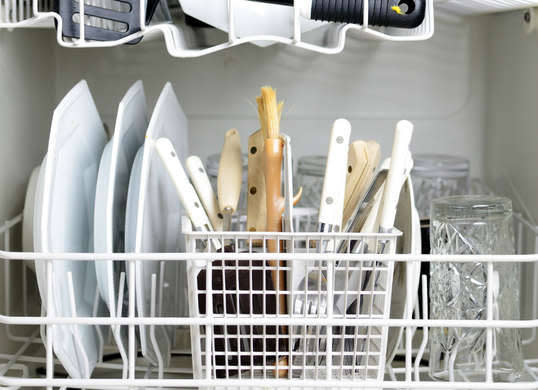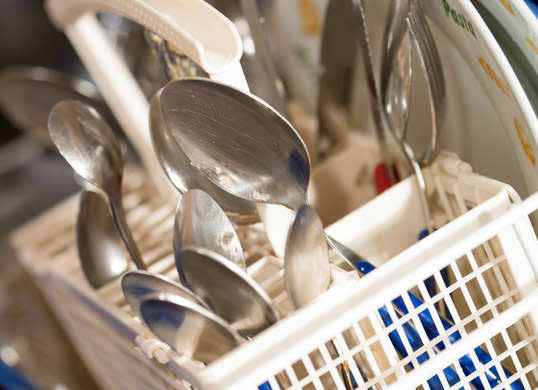9 Ways You’re Loading the Dishwasher Wrong
You may not realize it, but it is possible to load your dishwasher incorrectly—and doing so could result in broken, corroded, and continuously dirty dishes. Get the most out of your machine by avoiding these 9 bad practices that could be to blame for your less-than-sparkling dishware. —Jennifer Noonan

1. You’re Prerinsing
If you rinse your dishes before loading them into the dishwasher, you may be wasting water and energy. Dishwasher detergents are designed to cling to food particles and separate them from their surfaces, so unless you aren’t planning on running a load for several hours, simply scrape any large pieces of food into the trash and then load up the dishes. Photo: fotosearch.com
RELATED: 10 Cleaning Habits to Blame for Your Messy Home

2. You’re Placing Large Utensils Incorrectly
Avoid putting sharp knives and wooden spoons in the dishwasher, as the heat of the water can dull and degrade these items quickly. Large plastic and metal utensils—like spoons and spatulas—should lie flat in the top rack of the dishwasher. If you load them in the utensil basket, they may block the spray and keep water from reaching the rest of the dishes. Photo: fotosearch.com
RELATED: 10 Unusual Tips for Your Cleanest Kitchen Ever

3. You’re Putting Glassware Over the Tines
It’s a common misconception that glassware belongs over the tines in the top rack of the dishwasher. While cups and glasses do belong on the top rack, they should actually be placed in between the tines to prevent the cracks and chips that can occur when they rattle or bump against each other during the course of the wash cycle. Photo: fotosearch.com
RELATED: 9 Bad Habits That Are Killing Your Appliances

4. You’re Not Mixing Up the Silverware
Get spoons and forks squeaky clean by varying their positions in the utensil tray. Alternate their directions—with some handles facing up and others down—to keep them from nesting into each other. The more separated they sit, the easier it is for soap and water to give them the proper scrub down they deserve. Photo: fotosearch.com
RELATED: 7 Surprising Pantry Items Naturally Clean and Freshen Your Home

5. You’re Loading Every Plate in the Same Direction
Avoid loading plates in a single direction. Instead, arrange them all facing the center so they have even access to the soap and sprayer. When loading plates, alternate between large and small sizes to promote the best water flow and the deepest clean. Photo: fotosearch.com
RELATED: Your Dishwasher Can Do Better: 9 Tips to Boost Performance

6. You’re Placing Platters At the Front
Large platters, cutting boards, and casserole dishes should always be placed at the back or sides of the bottom rack. If these bulky items are loaded in the front, it’s possible that they will block the soap dispenser and prevent detergent from reaching the rest of the load. Photo: fotosearch.com
RELATED: 9 Brilliant Cleaning Hacks Everyone Should Know

7. You’re Putting Glassware on the Bottom Rack
It’s very tempting to stick a glass or cup in the bottom rack of the dishwasher when the top gets too full, but always resist. The top rack, which is specifically designed for glassware and cups, receives a much gentler wash than the bottom, where these more delicate items are at risk of breakage or other damage. Photo: fotosearch.com
RELATED: 9 Ideas to Steal from Real People’s Kitchens

8. You’re Mixing Metals
Keep your stainless steel and silver utensils well away from each other. If those two metals collide, they’ll produce a chemical reaction that can actually pit and dent your silver. If you must wash both metals in the same load, place them at opposite ends of the utensil basket to keep this from occurring. Photo: fotosearch.com
RELATED: 8 Brilliant DIY Ways to Reinvent Your Dinnerware

9. You’re Overfilling
Just like your washing machine, a dishwasher is less effective if it’s crammed full of stuff. If water and soap cannot freely circulate, your dishes will not come out clean. Avoid overcrowding your dishwasher, and hand-wash a few items if you must to ensure that each item gets the proper treatment. Photo: fotosearch.com
RELATED: 7 Clever (Unauthorized) Uses for Common Appliances